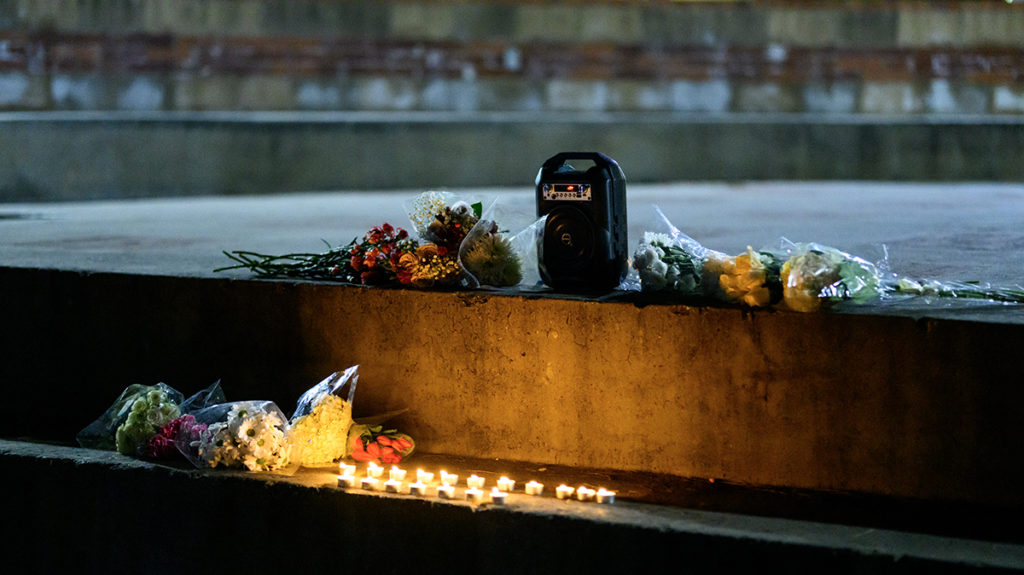Asian American Bruins discuss personal impacts of Monterey Park shooting
Monterey Park is pictured on a map with flowers and candles. (Constanza Montemayor/Daily Bruin senior staff)
The aftermath of the Monterey Park mass shooting and the national attention the community has received have been felt throughout the UCLA community, particularly for Asian American Bruins with close ties to the town.
Eleven people were killed and nine were injured in a mass shooting Jan. 21 at the Star Ballroom Dance Studio in Monterey Park, a suburb of Los Angeles. The shooting occurred on the eve of the Lunar New Year, a major holiday for many Asian communities, in a town that is 65.1% Asian.
Monterey Park – which was deemed the first suburban Chinatown in the 1990s – has been a diverse community for decades, said Min Zhou, a professor of sociology and Asian American studies and director of the UCLA Asia Pacific Center.
The town became a predominantly Asian enclave as a result of increasing immigration from Asian countries, including mainland China, and rising foreign investments from Taiwan, she added. Located in the San Gabriel Valley, it is a familiar and primarily middle-class community, she said, but the town is also home to communities that vary in class and immigration status.
However, Gay Yuen, an alumnus and chair of the board of directors of the Friends of the Chinese American Museum, said the city used to be much more hostile toward Asian immigrants. Dance studios like the Star Ballroom Dance Studio became popular because they provided a space for elderly immigrants to have fun without having to use English at a time when city council members campaigned to ban non-English signs, she said.
The violence, its timing and its location all sparked deep concern for many community members.
“I had many friends who went there, and unfortunately my heart was shaking because these friends (were) mostly first-generation immigrants like I am,” Yuen said.
Eric Ho, an education doctoral student who grew up in Monterey Park, said he woke up the following morning to a flood of messages from concerned friends. Ho said he recalled the community as a quiet place, one where he never imagined something like this could happen.
The shooter also attempted to attack another ballroom in Alhambra, a neighboring suburb where Ho currently lives.
“Where I live in Alhambra, I’m less than a mile from the second ballroom,” he said. “Monterey Park is already really close, but to be almost pretty much next door to where … another terrible thing could have happened – I think it really hit really close to home.”
The shooting in Monterey Park was followed two days later by another mass shooting in Half Moon Bay, California. Both perpetrators were elderly Asian men.
Zhou said there is a general social problem of gun violence that must be addressed, but she also pointed to a need for more resources, particularly mental health resources, for Asian American and immigrant communities.
“There is increasing need for support for the health of Asian Americans. … Immigrants are very susceptible to discrimination, racism, bias and stereotyping,” Zhou said. “The stress could build up, and then when there is no help and no support, it could get to a tragic outcome.”

Dozens of Bruins gathered Wednesday in Bruin Plaza for a vigil to honor the victims of both shootings, where speakers expressed dismay over the intracommunal nature of the violence.
Audrey Wong, a first-year psychobiology student who attended the vigil, said although the Lunar New Year is supposed to be a time of celebration, she is now spending it in mourning. Wong, who also grew up in Monterey Park, added that she was afraid the shooting would lead to negative connotations for the city.
However, the attention and affirmation the town has received have made her hopeful that its significance for many communities throughout Southern California will remain for years to come, she said.
“People should still feel comfortable to come to this community and to support it,” Wong said. “And so seeing these people come together and still taking a stand against whatever negative connotations that this shooting might have, … it’s giving me hope.”
